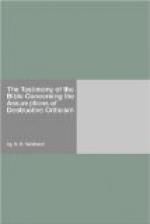Undoubtedly the prophet looked into the future, when the coming of the Messiah should bring the light of the gospel into that region so particularly described by him. And the inspired writer of the gospel of Matthew positively applies the context of Isaiah ix. 6 to our Lord. Then, proceeding with the explanation as to how the light should break forth in “Galilee of the Gentiles,” the prophet announces (verse 6) that, “for unto us a Child is born, unto us a Son is given: and the government shall be upon his shoulder: and his name shall be called Wonderful, Counsellor, The Mighty God, The Everlasting Father, The Prince of Peace.”
The reader may well investigate the language of this prediction, “for unto us a Child is born.” The “for” is given as an explanation, a reason for the coming light to “Galilee of the Gentiles,” a region and a people that had been for generations “in the shadow of death.” The light was to break forth because a child was to be born and a son given.
The announcement was made as if the event had taken place, though so far in the future. This is in accordance with the form of predictive prophecy, as in the fifty-third chapter of Isaiah, where the atoning work of Christ is spoken of as already accomplished, though it remained to be achieved in the future. The prophet said of that work: “He hath borne our griefs and carried our sorrows.... He was wounded for our transgressions.... He was bruised for our iniquities.... The Lord hath laid on him the iniquities of us all.” So it is stated in this prophecy: “For unto us a Child is born, unto us a Son is given,” for the promise of God is the same to him as the fulfillment. His word is equivalent to his deed. It cost him as much to purpose and pledge as to fulfill his pledge. Hence, the prophecy speaks of the thing as done, since God has promised to do it. Seven centuries before he came, the prophet said, “unto us a Child is born, unto us a Son is given.”
Our critical friends can not inform us who was the “Son given.” They can only say it must refer to some “near future event.” Let our Book speak for itself. It gives no uncertain testimony.
1. “The government shall be upon his shoulder.”
As already stated in the context, and affirmed by Matthew, it is he that should bring light to the Gentiles. There is only one who is himself “a light to lighten the Gentiles and the glory of thy people Israel.” (Luke ii. 32.) He said of himself: “I am the light of the world.” (John ix. 5.)
The government is his. He is the “Only Potentate, the King of kings and Lord of lords.” (1 Tim. vi. 15.)
There is only One Potentate, One Ruler, One who could say, “All power is given unto me in heaven and in earth.” (Matt. xxviii. 18.) There is only One who could say, “All things are delivered unto me of my father.” (Matt. xi. 27.) There is only One of whom it could be said, “Of the increase of his government and peace there shall be no end,” and that is said of the “Child born unto us and the Son given,” and is a part of the prophecy concerning him. (Isaiah ix. 7.)




